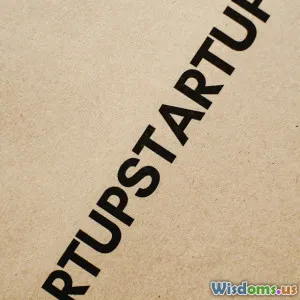
Are Corporate Giants Using Secret Networks to Control Markets?
8 min read Explore how corporate giants may use covert networks to influence markets, uncovering truths behind market control and secret alliances. (0 Reviews)
Are Corporate Giants Using Secret Networks to Control Markets?
In the bustling world of business, where the stakes are immense and billions change hands in milliseconds, the question arises: Are corporate giants using secret networks to control markets? This idea isn't merely fodder for conspiracy theorists; it taps into the longstanding fears and suspicions surrounding transparency, power, and influence in the global economic system.
This article unpacks these concerns by exploring whether these secret networks exist, how they function, and their impact on global markets. We'll dig into examples, analyze evidence, and explain the realities beneath the headlines.
The Myth and Reality of Secret Corporate Networks
At first glance, the concept sounds like something out of a thriller novel — a hidden cabal of executives and bankers pulling strings behind velvet curtains to manipulate markets. While some stories exaggerate, there is historical and contemporary evidence that corporate entities do form tight, confidential networks that can influence market behavior.
Historical Backdrop
During the late 19th and early 20th centuries, trusts such as Standard Oil established monopolies and manipulated markets to control entire industries. Today’s complex corporate alliances have evolved but can sometimes hold echoes of such monopolistic practices.
A fine example is the old cartel agreements, where companies historically fixed prices or market shares secretly (often illegal). Though cartel activities are prosecutable legally, modern-day forms might be subtler, involving intricate lobbying coalitions, interlocking directorates, or undisclosed strategic agreements.
Modern-Day Networks
In today’s age, networks may not wear a ‘secret society’ banner, but confidential relationships abound:
-
Board Interlocks: Senior executives and directors often serve on multiple corporate boards, creating a web of influence that can align strategies across companies.
-
Industry Consortia: Groups like the Semiconductor Industry Association involve major players coordinating on R&D investments and lobbying policies.
-
Lobbying Powerhouses: Corporations employ powerful lobbyists that operate in close quarters to influence regulations favorably.
-
Private Equity & Investment Networks: These groups often have substantial sway over portfolio companies, potentially steering market behavior behind the scenes.
Real-world example: The infamous 2008 financial crisis revealed how interlinked financial institutions shared risk and influence in ways that amplified systemic vulnerability, much of it hidden from public view.
Mechanisms of Market Influence Through Secretive Means
How exactly can such networks influence markets? The methods are multi-layered:
Information Asymmetry
Corporate insiders have private access to market-relevant information — earnings guidance, mergers, and acquisitions. When shared selectively within trusted networks, this can create unfair advantages.
In the UK’s Equity Capital Markets, for instance, groups of hedge funds meet confidentially, sometimes influencing IPO allocations and secondary-share movements discreetly.
Coordinated Market Moves
Large corporations or investment conglomerates might timeshare strategies to manipulate stock prices or commodities markets through coordinated buys and sells.
A notable case came from investigations into "bear raids," where combined selling efforts aimed to force stock prices down, benefiting certain stakeholders.
Regulatory Capture and Lobbying
Secretive corporate alliances often work towards shaping legislation and regulation that enable market dominance or erect barriers to competition. Lobbying disclosures often reveal connections running deep into government and regulatory bodies.
For instance, energy sector corporations frequently form coalitions to negotiate tax incentives and climate policy exemptions.
Cross-Company Collaborations
Published corporate partnerships sometimes mask more confidential arrangements. Tech giants are speculated to form unofficial working groups to control innovation cycles or market entry parameters.
Debunking the Conspiracy: Transparency and Oversight Mechanisms
While suspicions about hidden networks capture imaginations, it’s essential to recognize regulatory frameworks and corporate governance mechanisms aiming to ensure transparency.
Regulatory Bodies and Their Roles
Agencies like the Securities and Exchange Commission (SEC) in the U.S. and the Financial Conduct Authority (FCA) in the UK impose stringent disclosure rules on public companies to prevent insider trading and market manipulation.
Corporate governance practices mandate disclosures of board memberships and conflicts of interest, reducing the chances of unnoticed collusions.
Whistleblower Protections and Investigations
Enhanced whistleblower programs exist globally to encourage reporting of unethical activity within corporations, triggering investigations when credible evidence arises.
Examples include investigation outcomes against cartel conspiracies or insider trading rings that have emerged in various sectors.
Case Studies: Evidence of Secret Networks in Corporate Market Control
-
The LIBOR Scandal (2012): Major banks colluded to manipulate the London Interbank Offered Rate, a key benchmark affecting trillions in financial contracts worldwide. While unlawful, it showed how secret agreements between powerful entities impact markets.
-
Big Tech Collaboration Allegations: Recently, antitrust inquiries surfaced claims of informal agreements between tech conglomerates to split market territories or set mutual operational boundaries.
-
OPEC and Oil Markets: Though not a secret society, the Organization of the Petroleum Exporting Countries openly collaborates to control oil production levels, directly influencing global energy markets.
These cases exhibit that while not “secret societies,” regulatory breaches and coordinated market behaviors do occur behind closed doors.
Conclusion: Vigilance and Informed Participation
The idea that corporate giants operate through secret, exclusive networks to control markets holds pieces of truth but often risks over-simplifying complex market ecosystems. Genuine collaboration among corporations, especially when coordinated to the level of market manipulation or regulatory capture, does threaten competition and fairness.
However, regulatory vigilance, transparency requirements, and public scrutiny remain crucial to curbing abuses.
For investors, consumers, and policy-makers, understanding these dynamics translates into demand for higher accountability:
- Advocating for stricter disclosure laws
- Supporting robust regulatory enforcement
- Encouraging ethical corporate governance
Ultimately, while the myth of secretive corporate cabals controlling the world markets makes compelling headlines, appreciating the nuanced mechanisms allows for better-informed actions toward market fairness and integrity.
The enigmatic intersections of power, secrecy, and economics will continue to fascinate us. Staying informed is our best defense against the unknown realm of corporate influence.
Rate the Post
User Reviews
Popular Posts





















